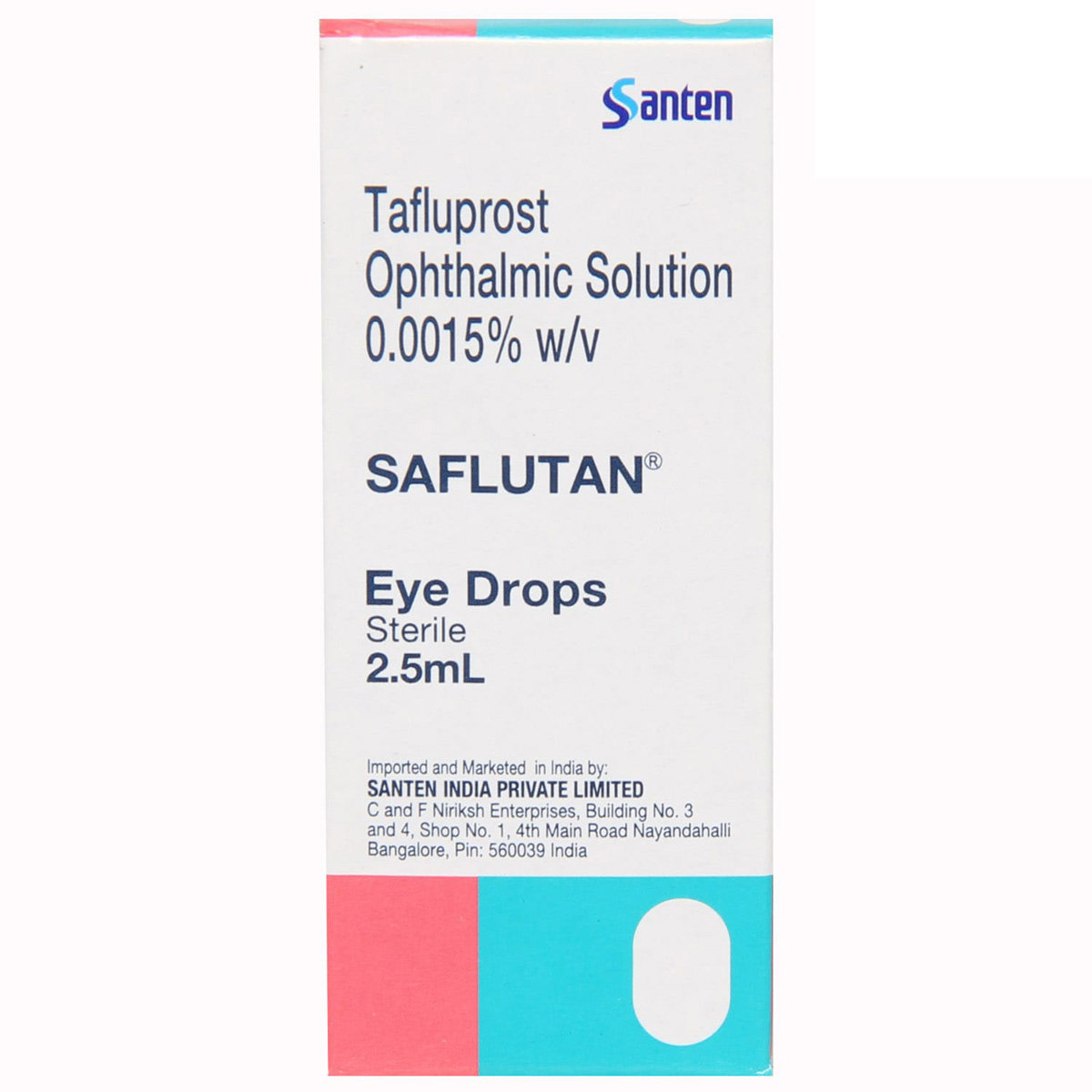Tafluprost
About Tafluprost
Tafluprost belongs to the group of medicines called prostaglandin analogue indicated for lowering intraocular pressure in patients with open-angle glaucoma or ocular hypertension. Glaucoma is an eye disease that causes damage to the optic nerve and results in reduced vision. Ocular hypertension is increased pressure in the eye due to poor drainage of aqueous humour (fluid in the eye that maintains normal pressure by its continuous flow).
Tafluprost contains ‘tafluprost’, which works by increasing the outflow of aqueous humour, thereby helps lower the increased pressure in the eye.
You are advised to use Tafluprost for as long as your doctor has prescribed it for you, depending on your medical condition. In some cases, you may experience common side effects such as headache, dry eyes, itching, irritation, and redness of the eye. Most of these side effects do not require medical attention and will resolve gradually over time. However, you are advised to talk to your doctor if you experience these side effects persistently.
Avoid using Tafluprost if you are pregnant or breastfeeding. Tafluprost is not recommended for children below 18 years as safety and effectiveness have not been established. Tafluprost might cause blurred vision; so, drive only if you have clear vision. Avoid touching the tip of the dropper as it may contaminate the contents. Keep your doctor informed about your health condition and the medicines you are taking to prevent any side effects/interactions.
Uses of Tafluprost
Medicinal Benefits
Tafluprost is an anti-glaucoma agent belonging to the group of medicines called prostaglandin analogue indicated for lowering intraocular pressure in patients with open-angle glaucoma or ocular hypertension. Tafluprost works by increasing the outflow of aqueous humour, thereby helps lower the increased pressure in the eye.
Directions for Use
Storage
Side Effects of Tafluprost
- Headache
- Dry eyes
- Itching in the eye
- Irritation in the eye
- Redness of the eye
Drug Warnings
Do not use Tafluprost if you are allergic to any of its components. Inform your doctor if you have/had asthma, cataract removal, COPD, liver/kidney problems, or if you have other eye diseases. Avoid using Tafluprost if you are pregnant or breastfeeding. Tafluprost is not recommended for children below 18 years as safety and effectiveness have not been established. Tafluprost might cause blurred vision; so, drive only if you have clear vision.
Drug Interactions
Drug-Drug Interactions: Tafluprost may interact with prostaglandin analogues (bimatoprost, latanoprost, travoprost, unoprostone, latanoprostene bunod)
Drug-Food Interactions: No interactions found/established.
Drug-Disease Interactions: No interactions found/established.
Drug-Drug Interactions Checker List:
Safety Advice

Alcohol
cautionIt is unknown if alcohol interacts with Tafluprost. Please consult a doctor.

Pregnancy
unsafeTafluprost belongs to pregnancy category C. Avoid using Tafluprost if you are pregnant. Please consult your doctor if you have any concerns regarding this. Women of child-bearing potential must use effective contraception during treatment with Tafluprost.

Breast Feeding
unsafeAvoid using Tafluprost if you are breastfeeding. Please consult your doctor if you have any concerns regarding this.

Driving
cautionTafluprost might cause blurred vision. So, avoid driving or operating machinery until your vision is clear.

Liver
cautionPlease consult your doctor if you have any concerns regarding the usage of Tafluprost in patients with liver impairment.

Kidney
cautionPlease consult your doctor if you have any concerns regarding the usage of Tafluprost in patients with kidney impairment.

Children
unsafeTafluprost is not recommended for children below 18 years as safety and effectiveness have not been established.
Habit Forming
Diet & Lifestyle Advise
- Include fresh vegetables and fruits in your diet.
- Avoid smoking and alcohol consumption.
- Avoid intake of baked foods such as cakes, cookies, doughnuts or fried items as these foods may worsen glaucoma and damage the optic nerve.
- Cut down your coffee intake as it may increase pressure in the eye. Replace coffee with green tea.
- Avoid exercises such as any position where the head is lower than the body, like an inverted yoga pose, as it may increase pressure in the eye. Doing selective exercises is advised for glaucoma patients.
Special Advise
- Tafluprost may cause darkening of the skin around the eyes. Wipe off any solution if it comes in contact with the skin to reduce the risk of skin darkening.
- Tafluprost might cause hair growth if the solution repeatedly comes in contact with the skin surface. Avoid contact of Tafluprost with the skin surface.
- Tafluprost might cause pigmentation of the iris, eyelid and eyelashes. Pigmentation of the iris could be permanent; talk to a doctor if you have any concerns.
- Tafluprost might increase the thickness and length of the eyelashes; however, it is reversible on discontinuation of treatment with Tafluprost.
- Women of child-bearing potential must use effective contraception during treatment with Tafluprost.
Patients Concern
Disease/Condition Glossary
Glaucoma: It is an eye condition that causes damage to the optic nerve (essential for good vision) due to abnormally increased pressure in the eye. If it is not treated in time, it may cause blindness. Usually, there are no symptoms for glaucoma initially, except the slow loss of vision gradually. However, some symptoms include visible rainbow-coloured circles around bright lights or blurred vision. Rarely glaucoma can develop suddenly with intense pain in the eye, visual disturbance or nausea.
Ocular hypertension: It is a condition caused due to poor drainage of aqueous humour (fluid in the eye that maintains normal pressure by its continuous flow). This leads to a build-up of excess fluid in the eye resulting in increased pressure inside the eye without any damage to the optic nerve. If ocular hypertension is not controlled, it may lead to glaucoma.
FAQs
Tafluprost works by increasing the outflow of aqueous humour, thereby helps lower the increased pressure in the eye.
Do not stop using Tafluprost on your own without consulting your doctor as it might increase the pressure in the eye leading to a permanent eye injury. Continue using Tafluprost for as long as your doctor has prescribed it to you to treat your condition effectually. Consult the doctor if you have any concerns.
Tafluprost might cause blurred vision for some time just after using it. So, avoid driving or operating machinery until your vision is clear to prevent any mishappening.
Tafluprost can be used with other eye medications if prescribed by the doctor. However, maintain a gap of 5-10minutes between Tafluprost and other eye medications.
Tafluprost might increase the thickness, length, number, and/or colour of the eyelashes and may cause unusual hair growth on the eyelids. However, eyelash changes are usually reversible upon discontinuation of treatment with Tafluprost.
Tafluprost may cause pigmentation of the iris, eyelid, and eyelashes. Wipe off any solution if it comes in contact with the skin to reduce the risk of skin darkening. Iris pigmentation might be permanent, please consult your doctor if you have any concerns.




